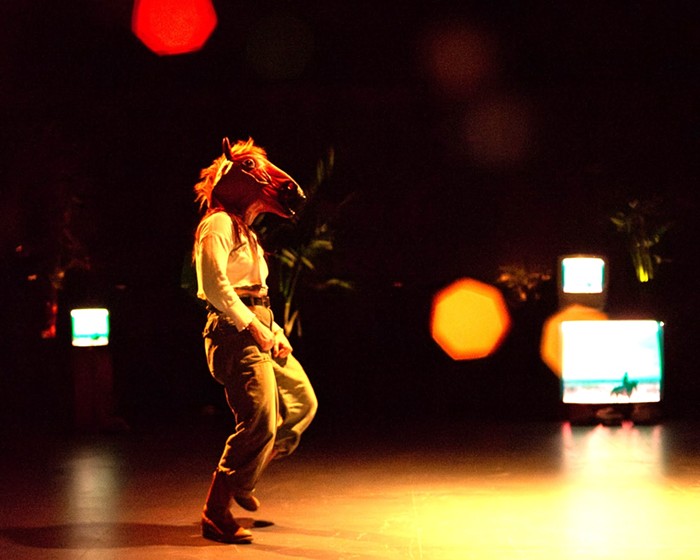The Bad Infinity
defunkt theatre
Through June 22
It's possible that I am a bit of a traditionalist. I like linear stories that take their characters from a clearly designated point A to a clearly designated point B. I like it when these characters reflect the subtitles of real human life, and I like it when they are given clearly designated internal struggles, like--should Hamlet believe the ghost of his father or not? I also like clever, natural sounding dialogue, intricate plot twists, and broad physical humor. I even like the occasional showtune.
Defunkt theatre's latest production, The Bad Infinity, portrays an evening in the lives of four characters who have gathered for a reason that I don't believe is ever quite explained. Talk goes on infinitely in this play, but it is talk that doesn't flow in a sensible direction. Individual lines don't always connect to the preceding lines, rampant tangents occur, and sometimes conversations even repeat themselves.
One man, John (Steve Boss) wants the others to think he is a man named Sam, but none of them do. A woman, Megan (Grace Carter), seems obsessed with just making sure that everyone has a good time. Her smile is a bit too large, her social gesticulations a bit too forced. Woman #2, Deborah (Frances Binder), is actively boring and pretentious, and Man #2, Ramon (Peter Buonincontro), is sleazily businesslike. These people occupy the same space, but they don't seem particularly aware of each other; they don't respond to each other's comments as much as they use those comments as springboards to talk about things on their mind, that nobody else really understands. The weirdness of their dialogue is helped along by certain action sequences. In one scene at a restaurant, plastic food is lowered down to them from the ceiling. Later on, a dead Santa Claus is carried past them on a stretcher.
Eventually, the play moves away from them and switches to a setting in the woods, where the Sam that John was talking about resides. Sam (Song Kim) fishes and drinks cheap beer that is handed to him through a hole in a tree by a man in a kangaroo suit. He also talks to a French chef (Ingrid Carlson). A short time later, the play ends.
Formulating an opinion of this material is problematic for me because I don't want it to be grounded in my traditional theatrical belief system. I am aware that Infinity occupies a world where my love of linear storytelling does not apply. It is my duty as a critic to critique this world for what it is and not within the context of a preconceived notion.
Or is that my duty? Perhaps it's more important for me to share my feelings honestly than it is to try examine a play in a completely motionless light, just so I don't come off sounding like a prude. Because the fact is, I didn't enjoy watching The Bad Infinity. It distanced itself from me with its bizarre diatribe, to a point where I felt disconnected from it on nearly every level. I did not like any of the characters, I could not garner a story from it, I did not find it funny, and I did not find it thought provoking. It scares me to say all that.
What is the better thing to do? Convey my gut reaction to a play that in the confines of reality, doesn't make an ounce of sense, or try to force myself into the reality that the play does occupy and enjoy it in a way that feels unnatural? If you have an answer, then I welcome it.
Until then, I will give Infinity the thumbs down, but on the condition that it is possible, and maybe even probable, that I have been a prisoner raised from birth in a cage of society's making. Does an elephant raised in captivity miss the wild? They say no, but how can you tell until you set it free and watch what it does? I'm pretty sure that defunkt wants to set us free and watch what we do, and for that, they should be commended. For some of us, that cage is a strong one, though. Ooh, it's a strong one, with bars of pure steel. JUSTIN SANDERS


















